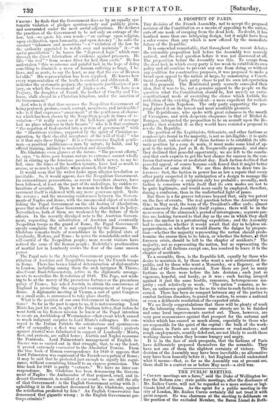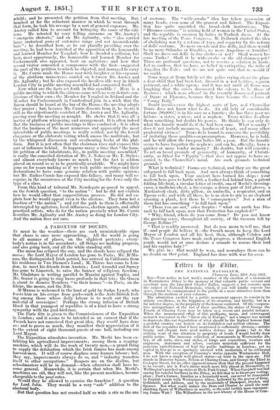THE PUBLIC MEETING.
"C01737.17 meetings are a farce," said the Duke of Wellington be- fore the Reform 'era: civic public meetings, after the disclosure of Mr. Raikes Currie, will not he regarded as a more serious or legi- timate kind of drama. As the agent for a public meeting in the city of London, Mr. Raikes Currie certainly did not treat it with great respect. He was chairman at the meeting to deliberate on the position of the excluded Member, the Baron Lionel de Roth-. schild; and he presented the petition from that meeting. But, laughed at for the reluctant manner in which he went through that form he took his revenge by a sort of general exposure. Mr. Anstey Willed him to account for betraying the cause of the citi- zens. He retorted by very telling sarcasms on Mr. Anstey's " energetic rhetoric," and on Mr. Aglionby, who " also carried large oratorical guns of extensive range and not inconsiderable bore " ; he described how, as he sat placidly presiding over the meeting, he had been horrified at the apparition of the honourable and learned Member for Youghal; how he dreaded a collision, but how, most opportunely, the honourable and learned Member for Cockermouth also appeared, bent on agitation ; and how that second visitor concocted a compromise with the first—suggested the part of the petition to which he objected, and managed to carry it. Mr. Currie made the House roar with laughter at his exposure of the platform manceurres carried on between Mr. Anstey and Mr. Aglionby ; but he also exposed the heedless idle way in which London City in public meeting assembled had comported itself.
Now what are the facts set forth in this squabble ? Here is a public meeting to which the citizens came with no very definite con- clusions of their own ; the Member for Youghal in Ireland and the Member for Cockermouth in Cumberland join in a wish that the Baron should be heard at the bar of the House; the meeting adopts that prayer ; but, because Mr. Currie dissents from it, he treats it still as the objectionable crotchet of Mr. Anstey and Mr. Aglionby, passing over the meeting as naught. He shows that it was all a matter of platform whispering and arrangement. It is often indeed that the business of public meetings is thus conducted ; it is often that the business of the most numerous and apparently the most intractable of public meetings is really settled, not by the fervid eloquence or the elaborate voting which amuse the multitude, but by the whispered discussion and overbearing becks of the plat- form. But it is not often that the chairman rises and exposes this sort of influence behind. It happens many a time that "the hum- ble petition of the inhabitants, &c.' in public meeting assembled," is really the conceited dictation of Mr. J. Nokes or Mr. T. Styles; and almost everybody knows as much ; but the fact is seldom placed on record so as to be practically available. We might have gone on for years making as if we took public meetings and their declarations to have some genuine relation with public opinion; but Mr. Raikes Currie has exposed this fallacy, and many will re- cognize in the occurrence at the City meeting for the Jews only the type of a class. From this kind of tribunal Mr. Newdegate proposed to appeal, on the Jewish question, "to the nation": but he did not explain how he would effect that supposititious process. He did not ex- plain how he would appeal even to the electors. They form but a fraction of "the nation "; and yet the path to them is effectually intercepted by agitators local influences, election agents and other practised artists, who do for the nation precisely what lir. Currie describes Mr. Aglionby and Mr. Anstey as doing for London City. And the nation does not care.



























 Previous page
Previous page